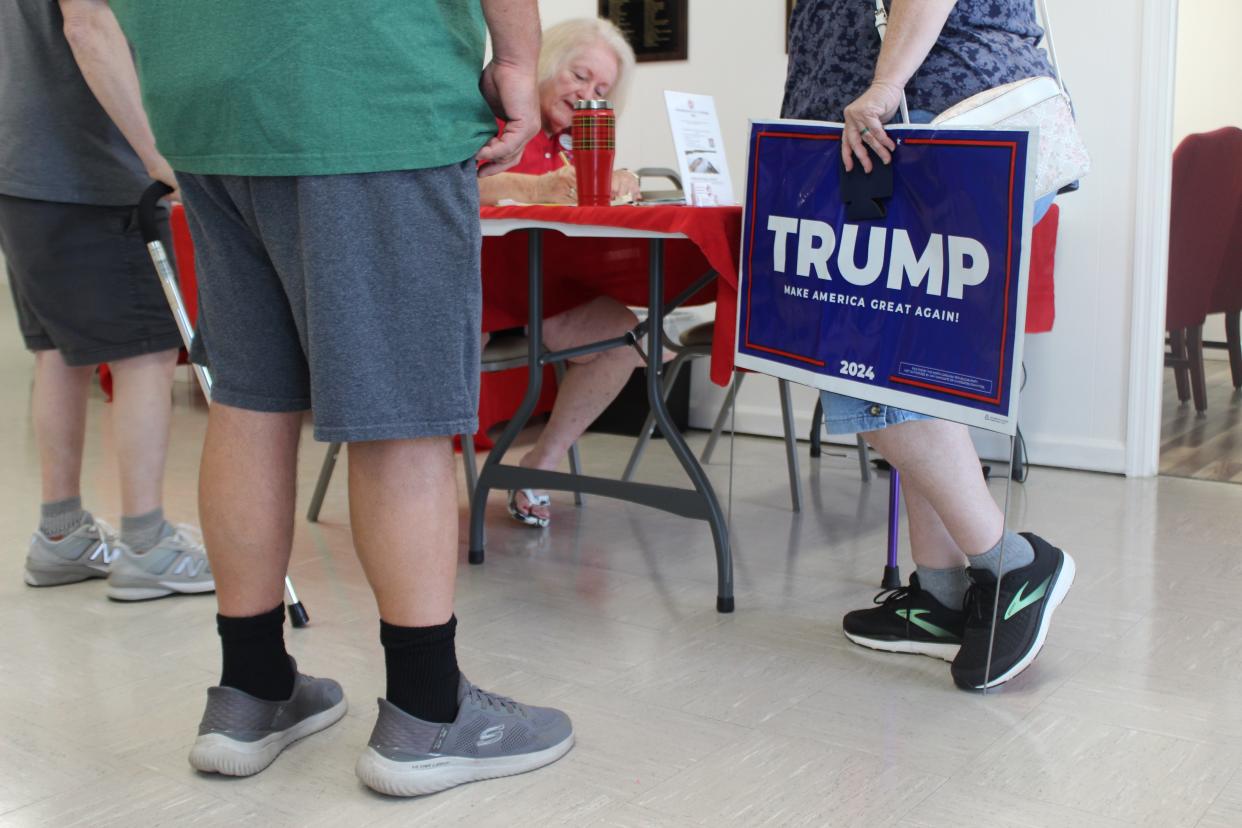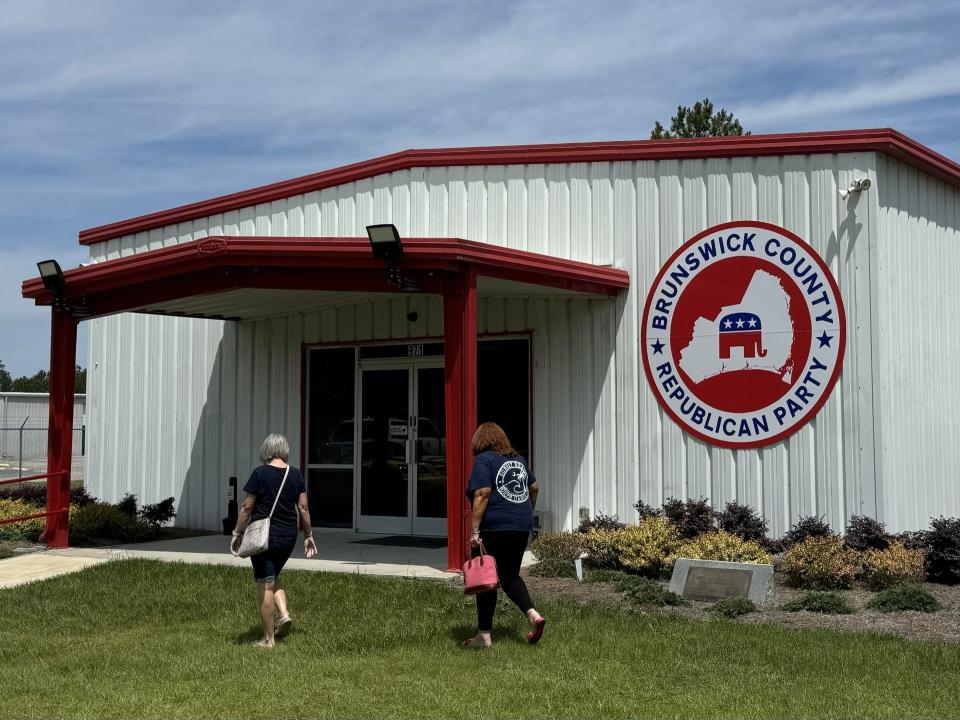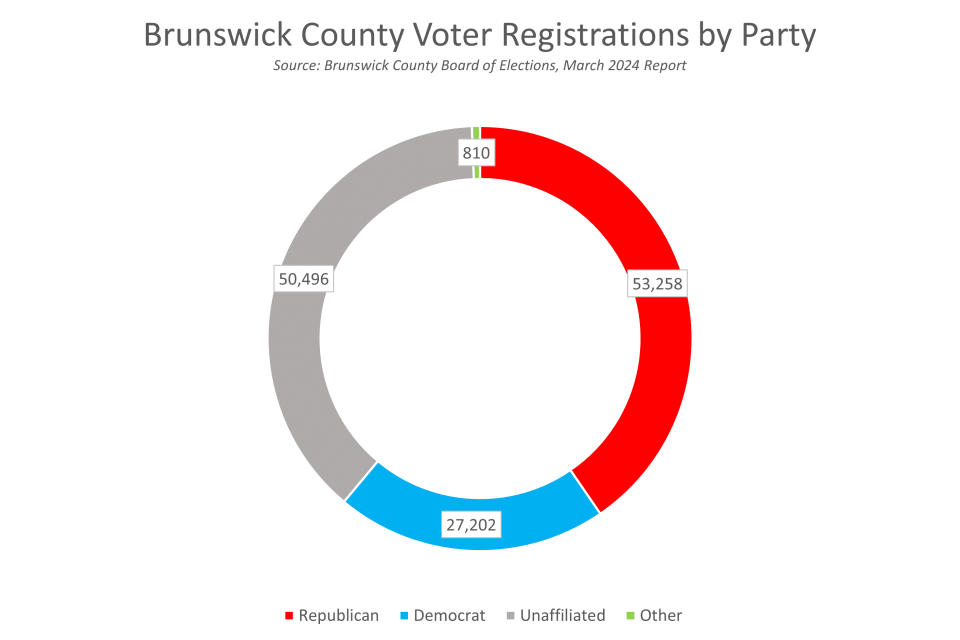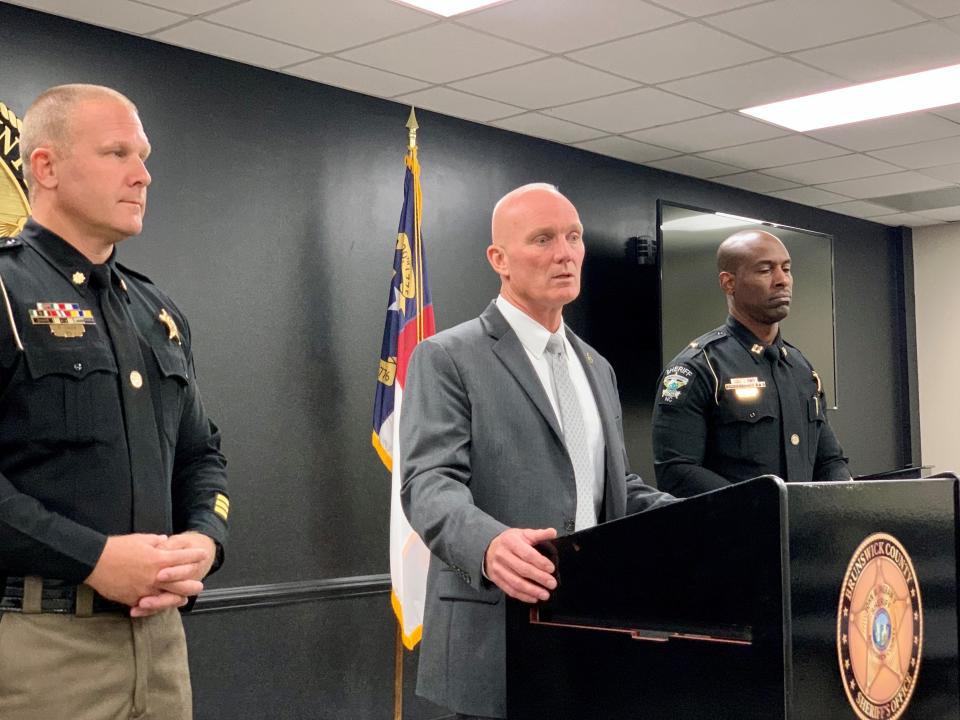North Carolina’s fastest-growing county is getting redder. What’s behind Brunswick's shift?

The headline of a June 19, 1983, article in the StarNews showed one party's popularity in Brunswick County: "10 Democrats trying for sheriff's job in Brunswick."
Each of the 10 men looked to fill the unexpired term of the Democratic sheriff who had been forced to resign after he was convicted on five counts of conspiring to smuggle drugs, according to the report.
"From what I understand — and, again, I wasn't here — you couldn't even get a job around here unless you had a 'D' next to your name," said Bill Moore, current chairman of the Brunswick County Republican Party.
Forty years later, two Democrats running for one elected position in Brunswick County is hard to imagine, let alone 10. All locally elected officials from Brunswick are Republican.
The county’s sheriff seat has been held by a Republican since 2009. Strictly Republicans have been elected to the five-member Brunswick County Board of Commissioners and five-member Brunswick County Board of Education since at least 2008. Several officials have switched from Democrat to Republican.
Brunswick remains one of the fastest growing counties in North Carolina. But it’s also an anomaly: As it grows, the county gets redder.
"Brunswick may become the flagbearer for the state going red," Moore said.
Bucking the trend

Brunswick has seen an 85% increase in its population over the past 20 years, making it the fastest-growing county in the state and the fourth-fastest-growing county in the nation, according to its Blueprint Brunswick 2040 planning document.
Also in those two decades, Republicans seeking local offices have seen great success, despite Democrats holding many elected positions in decades past.
Chris Cooper, director of the Public Policy Institute at Western Carolina University, said this combination of growth and Republican political success is “fairly unique.”
“Usually, growth counties are counties that are trending bluer, so Brunswick County kind of bucks that trend,” Cooper said. “Brunswick County is a place that is experiencing high-end migration but also increasingly friendly environments for the Republican politics, and so that’s what makes it unusual.”
Statewide, Cooper said, North Carolina is a deeply purple state – with competitive presidential, gubernatorial and U.S. Senate races. The counties in North Carolina, on the other hand, are largely very red or very blue.

“Our counties are becoming increasingly redder or bluer,” Cooper said. “[Brunswick County] sort of fits the pattern of very, very few purple counties in a purple state. It bucks the pattern because it is growing and reddening.”
According to county voter registration data, Democratic Party registrations in Brunswick County have nosedived, especially in the past four presidential election cycles. In that time, Republican voter affiliations have grown slightly, and unaffiliated registrations have grown steadily.
In 2012, about 37% of the county’s registered voters were Republican, 34% were Democratic and about 30% were unaffiliated. From 2012 to 2024, the percentage of Republican registered voters grew to around 40% (53,258 of 131,766 registrations) while the share of Democratic registrations plummeted to around 20% (27,202). Around 38% (50,496) of the registered voters in the county are unaffiliated. There are just a handful of Green Party and Libertarian registrations (810 total).
Shelley Allen, chair of the Brunswick County Democratic Party, said unaffiliated voters tend to align more with the more represented party in their area – so in Brunswick County, unaffiliated voters tend to lean more Republican. Moore agreed, adding that unaffiliated voters side with Republicans in the county about two-thirds of the time.
Right people, right place, right time
Today, all locally elected officials in Brunswick are Republican: including, namely, the five members of the Brunswick County Board of Commissioners, the five members of the Brunswick County Board of Education and the three state legislators whose districts include Brunswick.
The shift wasn't sudden, rather, Republicans slowly took control of the boards and offices in the county.
In the 2002 general election, Republicans took control of both the board of commissioners and board of education – a flip that had happened a few times in the preceding decade. But, this time, it was different.
In September 2002, just weeks before the November general election, the board of commissioners had four Democrats among its five members. Then came a party switch.

Then-Commissioner Bill Sue surprised the county with an announcement that September that after more than 30 years as a Democrat, he’d be changing his party affiliation to Republican.
“I was elected to a four-year term in 2000 as a Democrat,” Sue recalled. “And I couldn’t stomach them anymore.”
Sue said he made the switch largely because he felt his religious beliefs did not align with the Democratic Party, specifically when it came to the issue of abortion.
Less than two months later, Democrat Don Warren lost his seat to Republican Phil Norris after two consecutive terms on the board. With David Sandifer retaining his seat, the board then had a Republican majority of 3-2.
“It just happened, and it happened because of the right people in the right place at the right time,” Sue said.
In the 2008 primary election, Democrats fought to secure their spot on the November ballot in several races, including the District 1 and District 4 seats on the board of education, and the District 3 and 4 seats on the board of commissioners.
Ultimately, these contests saw Republicans prevail in November. Democratic incumbents on the board of commissioners, May Moore and Tom Rabon, easily won their primary contest but were unseated in the general race, resulting in the creation of a fully Republican board. Republicans have been elected to the five seats on both boards ever since.
Moore attributes the party’s ability to meet “the needs of the county” as the reason for its success.
“I think people got tired and they wanted fresh ideas and they wanted change,” Moore said. “Republicans at that time offered that change and, up to this point, they’ve delivered on it, which is why they’re still in office.”
Sue attributes the county’s growth over the past two decades to the Republican leadership.
“Under the Republican leadership, Brunswick County moved to the forefront,” Sue said. “We expanded water. We instituted sewage. We built a bunch of new buildings. We built a bunch of new parks. We built a new [administration] building, a new social services building, a new courthouse, a new parks and recreation building” – all projects he said wouldn’t have happened under Democratic leadership.
“We built the infrastructure so that people could come,” Sue said.
Making the switch
Sue wasn’t the only Brunswick leader who jumped from a blue boat to a red one.
In 2008, the Brunswick County Democratic Party nominated John Ingram to replace former Sheriff Ronald Hewett after Hewett was removed from office and convicted on obstruction of justice charges.
In November 2009, Ingram stunned local party leaders when he announced via news release that he was switching his party affiliation to Republican.

In a statement at the time, Ingram explained the switch by saying, “It is after much reflection and contemplation that I have decided to join the Republican Party. Though my career in law enforcement as a Democrat has brought me to this place in time, it is my humble choice to live free as my conservative principles and discipline desire.”
Ingram retired in April 2023, and the Brunswick County Republican Party recommended Brian Chism to serve the remainder of Ingram's four-year term, which ends in January 2027.
While serving as a member of the board of education, Charlie Miller changed his party affiliation from Republican to Democrat in 2008. He told the StarNews at the time he made the switch so he could vote for Ingram in the 2010 election. When Ingram changed his affiliation to Republican, Miller switched back, a move that created an all-Republican board of education in Brunswick.
Olaf "Bud" Thorsen was a longtime board of education member in Brunswick County. For 10 years, he served on the board as a Democrat before losing the 2004 Democratic primary. He switched his party affiliation from Democrat to Republican and secured a seat on the board again in 2008 and 2012.
Moore said it’s Brunswick County’s low tax rate and geography (namely, beaches) that has attracted Republicans.
“Why change something that works?” he said.
Looking forward
The Brunswick County Democratic Party has not yet lost hope.
“We’re still fighting to get Democrats elected in Brunswick County,” Allen said.
This year, Democratic candidates look to challenge Republican incumbents in each of the board of commissioners' races. Three seats on the board of commissioners are up for election in November – Districts 3, 4 and 5.
Each of the Republican incumbents in those seats – Pat Sykes, Mike Forte and Frank Williams – are seeking reelection. Democrats Tom Simmons and Jonathan Damico are running against Forte and Williams, respectively.
Democrat Robert Fulton is running against Sykes, though he will appear on the ballot as an unaffiliated candidate. Allen explained that Fulton was not approached to run for the position until after the filing deadline had passed. (The candidate initially running as a Democrat had to withdraw due to personal reasons, Allen said.)
North Carolina law says a candidate can petition to appear on the ballot after the filing deadline, but they will appear as an unaffiliated candidate and must collect signatures from 4% of the county’s registered voters – approximately 5,200 signatures.
Three seats on the Brunswick County Board of Education are also up for election in November. Only one race is contested – the District 4 seat in which Democratic challenger Janis Simmons looks to unseat Republican incumbent, and the board’s current chair, Steven Barger. Republicans Catherine Cooke and Vickie Smith are running unopposed.
“We’re not giving up,” Shelley said. “It’s far too important.”
Moore said he doesn’t see a flip coming any time soon.
“I think as long as the Republicans continue to stick to their values and deliver to the people, I think they’ll be in office for a while,” Moore said. “I think we’ll have a bright future in Brunswick.”
Jamey Cross covers Brunswick County for the StarNews. Reach her at jbcross@gannett.com or message her on Twitter/X @jameybcross.
This article originally appeared on Wilmington StarNews: What’s behind the move to Republicans in Brunswick County, NC?

